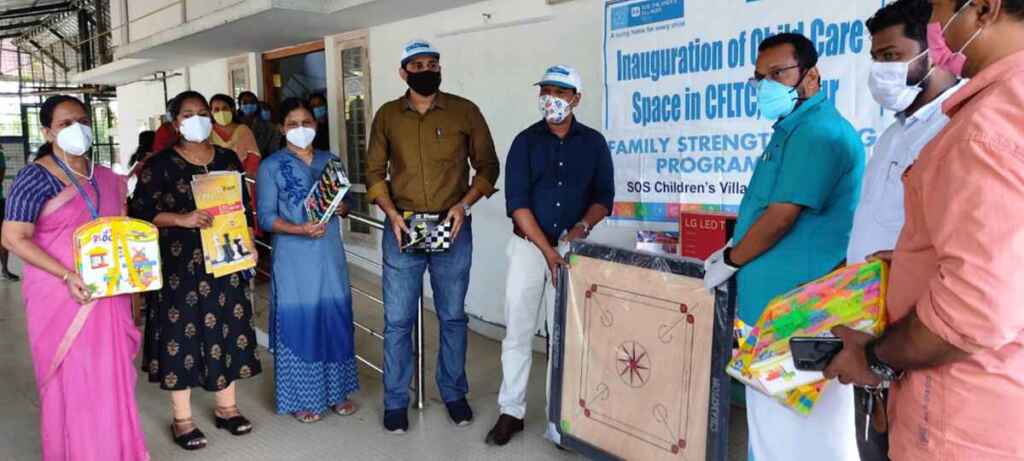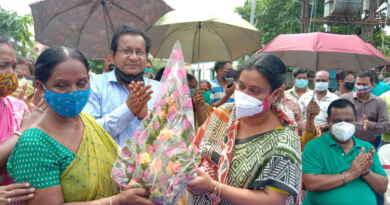Disaster Preparedness must focus on Children at the risk of losing Parental Care: SOS Children’s Villages of India
Desk Correspondent, abptakmaa, Kolkata, 17th Dec 2020 : “As the world’s youngest democracy, and one that is most prone to natural disasters, India must be well prepared to rescue children who face the risk of losing parental care at the times of disasters and emergencies such as cyclones, floods, earthquakes, droughts, and pandemics,” urged experts.
Participating in a virtual media briefing on ‘Impact of Natural Disasters on Children’, organised by SOS Children’s Villages of India (SOSCVI), India’s largest child care NGO providing family-like care for children without parental care, the experts: Mr. Sumanta Kar, Senior Deputy National Director, SOSCVI, and Mr. Anil Kumar Sinha, IAS (Rtd.), mentor and consultant on hazardous risk management, climate change adaptation & sustainable development, said that natural disasters and extreme weather events have become a growing threat to the well-being of children. Globally at least 175 million children are affected by such and other natural disasters every year.
They pointed out that India’s unique socio-economic, and geo-climatic conditions make it one of the most vulnerable country to natural disasters. The Global Climate Risk Index Report 2019 ranks India as the 14th most disaster prone country in the world. Further, over 40% of its population is below 18 years of age. Given this backdrop, India ends up becoming one among the countries with the highest number of affected children.
The experts noted that in the event of a natural disaster children from poor families become more vulnerable to injuries – their risk of succumbing to injuries is high, in the absence of timely medical care. Natural disasters disrupt food supply. Hence children suffer from hunger and malnutrition. They get diarrheal illnesses owing to water contamination.
They said that psychological damages to the children are worse, and may long last well into their adulthood. Disasters frighten the children and make them successful. Events like damages to their homes and possessions, displacements and migration of their families, the experience of watching the stress their parents undergo, and losing loved ones – all can leave children emotionally drained. Further, breakdowns in social networks and neighborhoods and loss of livelihood of parents can create a situation for neglect or abuse of children.
Talking about the education of vulnerable children, the experts said that when their families lose their livelihood or are displaced, the education of the children is disrupted. Many children from the vulnerable families hit by disasters are forced to take up work.
On the core components of children-focused disaster preparedness, the experts said that it is not just about distributing food or hygiene kits, but also about building capacity at local communities, taking care of the emotional well-being of the children by setting up necessary physical infrastructure and securing the services of professional caregivers, and rebuilding livelihoods of parents and caregivers.

In his address, Mr. Anil Kumar Sinha, said, “Though natural disasters appear to affect everyone the same, in reality they affect children and women more as they are by far the most vulnerable. The impact is also high on and marginalised communities. Children suffer tremendous psychological trauma – as evident from the ongoing pandemic, children are deprived of their basic freedom to play outdoors, interact with their peers and to learn. Hence it calls for effective risk communication and community engagement in response to management of disasters. SOS Children’s Villages of India is doing a commendable job on these two fronts. Other organisations working in this space can benefit by imbibing their good practices.”
In his presentation on the disaster management activities of SOSCVI, Mr Kar said that his organisation had supported 15,000 children during emergencies and disasters in 2019. The NGO reached out to children and their communities during major disasters in the past, including earthquakes of Latur (Maharashtra, 1993) and Bhuj (2001), Tsunami (southern coast -2004) , Cyclone Fani (2019) and more recently Amphan, Nisagra, Nivar and Burevi, and COVID-19 (2020).

“As a response to COVID-19, we focused on safeguarding our own children (over 6,500) who live in our Villagesby safeguarding their health and emotional well-being as well as ensuring that they continue to get an education using digital means. We also looked after children (over 17,500) of the vulnerable communities, where we run our Family Strengthening Programme. The latter is an outreach programme that prevents ‘at risk’ children from losing parental care by securing and upholding family incomes sustainably by empowering women. During lockdown, we supplied essential food and hygiene kits to them. We are now working on the restoration of lost livelihoods or developing alternative livelihoods through capacity building and skilling. We also ensure that the children of vulnerable families continue to get digital education and activity based learning,” he said.
SOSCVI reached out to more than 26,500 children (including 2,500 new children) in 2020 through these interventions. It had set up two quarantine centres in Bhopal and Pune for abandoned children. It opened a Child Care Space at a Covid 19 First Line Treatment Centre in Puthur Panchayat in Kerala. By 2021, the NGO is planning to have increased its capacity adequate enough to reach out to 8000 new children. Publicity : Perfect Relations.



